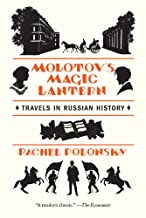Early on in Molotov’s Magic Lantern Rachel Polonsky quotes Osip Mandelstam as saying “Ask me for my biography, and I will tell you the books I have read.” (p. 6) From that perspective, Polonsky braids three biographies. One is Vyacheslav Molotov, erstwhile foreign minister of the Soviet Union whose former apartment a banker friend of Polonsky’s comes to inhabit in the 1990s; some of Molotov’s personal library, with annotations in his hand, remained on the shelves in the apartment. Another is the late Cambridge don of Russian literature, Edward Sands, who learned the language during the war when he was on convoy duty in and out of Murmansk and other chilly places. The third is Polonsky herself; although the book is not labeled an autobiography, she cannot write so much about people, places and books as much as she does without revealing a great deal of her own story.
Molotov’s Magic Lantern carries the subtitle Travels in Russian History, and while that’s true, it is also a collection of travels in Russia itself. Polonsky has built the book in something like a spiral, beginning in Molotov’s apartment and turning outward, moving around Moscow before essaying its suburbs, then Novgorod, Rostov-on-Don, moving into Russia’s great distances to encompass Archangel and the far north, Irkutsk, Ulan Ude and Baikal. In an epilogue, she returns to Moscow, sitting in the Lenin Library before walking the Alexander Gardens alongside the walls of the Kremlin. In the end, there are more books, a final reckoning with Molotov, his library, and the facts of change in Moscow.
Every page has something interesting, or something to inspire deeper reflection, or something surprising, an unexpected connection or vivid details that bring the past into the present. Many pages have all of these together.
After a walk around her Moscow neighborhood, during which Polonsky has sketched the imperial and communist-era connections among the buildings on her small street and noted the latest wave of renovation on Corner House, a late imperial construction that “had been allowed to decay during the Soviet period.”
(In the course of describing the new fittings, she mentions that the entrance to the courtyard was now set off with a shlagbaum, an arm-style parking lot barrier. The Russian word is of course just a transliteration of the German word Schlagbaum, a reminder that Russian plunders foreign languages as readily as English does, and has for centuries. Russian for hairdresser is парикма́хер, Perückenmacher [wig-maker] from German. There’s a word for strong surprise, Пердимонокль, “perdu monocle,” French for “lost monocle” from when someone is so surprised that the monocle drops right off their face. English is more likely to be a source these days, speaking of change.)
Moscow is eternal and newly constructed, its ancient charms continuously lost to modern change. Nevermind that one generation’s unsightly moderns are another’s trusted old landmarks. And have been for a good while.
To appreciate the beauty of Moscow, one must settle down and live here, the art critic Pavel Muratov wrote in 1909. Moscow’s “genius of place” lies not in the extrovert, premeditated beauty of grand public spaces or harmonious architectural ensembles, but in its haphazard, intimate, muddled beauty, a beauty made by people and their money, not by the state. There is nothing one can do to unify Moscow, Muratov said, it is always “incoherent, disconnected, inconsistent.” To learn to love the city is to become familiar with its little lanes and side streets. Its charms can be discovered either through careful study or quite by chance, at the very moment when one’s attention strays. Yet to learn to love Moscow is also to become familiar with a certain kind of grief, for it is not a city whose authorities are much given to its conservation. Moscow advances architecturally in sudden rushes of new prosperity or state ideology after bursts of frenzied destruction, from without or within, or long periods of stagnation and neglect, leaving all those who love “old Moscow” to their quiet laments. (p. 29)
Looking back a century, Polonsky found the writings of someone who detested the late 19th century buildings that so charmed her and marked her image of old Moscow. “‘All these buildings of the “New Moscow” are without a future,’ Count [Sergei Dmitrievich Sheremetev] wrote defiantly in the summer of 1902 in Moscow Recollections as though on one appointed day the new buildings would disappear and give him back the vistas he had once loved and owned. ‘Old Moscow’ will survive them, he promised, for without it there could be no Russia. In an orgy of ‘intoxicated capitalism’ in which the city no longer knew itself nor called itself by its own name, the heart of Moscow was being transformed, filled up with ‘shameful’ and ‘degenerate’ new buildings, hiding from view its ancient churches, which were left to fall into ruin.” (p. 30)
Polonsky is equally fascinated, erudite, and enthusiastic as she ranges across Russia and adds depth from her knowledge of history, literature and culture. She does not gloss over problems or the brutality of much of Russia’s history, but she show richness and connections, the human comedy and the closeness of the past. Visiting a dacha colony at the invitation of friends, she notes that the particular group had been the location of summer homes of many leading Soviet scientists, in part as a reward for their work on atomic weapons. She juxtaposes Sakharov’s dissidence with the notes that Molotov made in his copy of Studies of War: Nuclear and Conventional (London, 1962) that justified the Soviet nuclear program.
Ask me for my biography, and I hope this is one of the books I mention; its Russia is unforgettable, vast and entrancing, warm and distant, past ever present.

